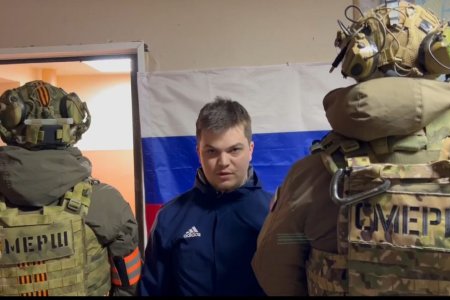
A ‘court’ in Russian-occupied Crimea has sentenced 28-year-old Valeriy Shevchuk to five years and 10 days’ imprisonment over comments he made on YouTube posts. It was claimed that the comments, expressing criticism of Russia’s army, constituted ‘calls to carry out extremist activities’, under Article 280 § 2 of Russia’s criminal code.
The indictment against the young Ukrainian from the village of Partyzany claimed that he had sought out channels containing videos on YouTube against what Russia insists on calling its ‘special military operation’ [i.e. its full-scale invasion of Ukraine]. He was alleged to have left comments under such videos “with calls to carry out violent actions against a group of people differentiated by nationality.”, that is, against Russians. While no examples were provided, previous experience of such prosecutions can only strengthen scepticism about the charges. It is likely that Shevchuk’s comments pertained to the Russians invading his Ukrainian homeland.
The 5 years and 10 days sentence, to be served in a medium security prison colony, was handed down on 25 February 2025 by the occupation ‘Kirovsky district court’ The same ‘court’ banned Shevchuk from administering websites for a further two and a half years.
This was the first criminal prosecution, but not the first time that Valeriy Shevchuk had been persecuted for opposing Russia’s war against Ukraine.
On 19 June 2024, the same occupation ‘Kirovsky district court’ imposed two fines of 45 thousand roubles each for images of Russian leader Vladimir Putin with the ‘Z’ which has become the symbol of Russia’s war of aggression against Ukraine on his forehead and “an insulting caption”. The first administrative prosecution was under Article 20.1 § 3 of Russia’s administrative code, with this about posting information on the Internet expressed “in indecent form, insulting human dignity and public morality, [expressing] open disrespect for the public, the state, and official state symbols of the Russian Federation.”
The same images would seem to have been used for a second charge of ‘discrediting Russian armed forces’ under Article 20,3,3 § 1. The latter is one of the four administrative and criminal charges rushed into legislation ten days after Russia began its full-scale invasion of Ukraine
Shevchuk was also jailed for 13 days under Article 20.3 § 1 (public demonstration of prohibited symbols). This was over a photo of Right Sector, a Ukrainian nationalist organization that Russia first heavily demonized, and then banned as ‘extremist’.
Protest in occupied Crimea
While publicly claiming that all Crimeans are united in their support for Russia’s so-called ‘special military operation’, the Russian occupation regime are carrying out mass prosecutions of Crimeans for demonstrating a pro-Ukrainian position or anti-war views. A huge number of such cases are linked with the notorious collaborator Aleksandr Talipov and his so-called ‘Crimean SMERSH’ vigilantes. While Crimean SMERSH is supposedly a civic initiative, it clearly works in very close collaboration with the occupation enforcement bodies, in hunting down Ukrainians for their views. A particularly repugnant part of this is the manner in which the SMERSH targets are forced – either through torture or threats – to ‘publicly repent’ on video. Such videos typically appear at the same time that occupation ‘courts’ find the victims ‘guilty’ of the above or similar charges and impose fines or brief terms of imprisonment on administrative charges. In some cases, criminal prosecutions are also initiated over actions which, in any democratic country, would fall under freedom of speech, freedom of assembly, etc. ‘Guilty’ verdicts are near guaranteed in such cases, regardless of the absurdity of the charges, with people having been jailed for 15 days, merely for playing Ukrainian patriotic songs.



